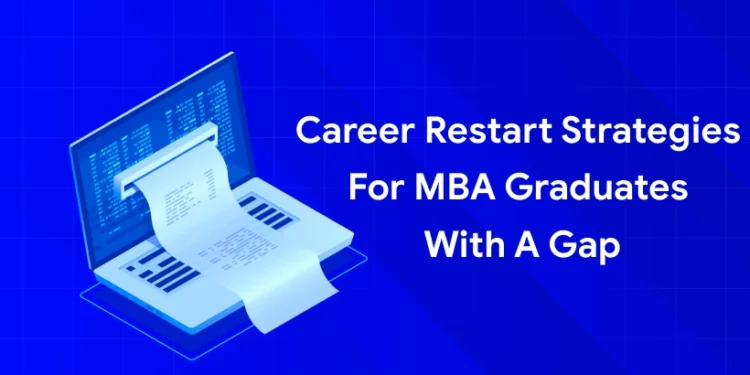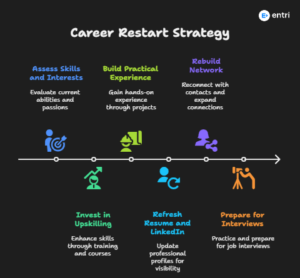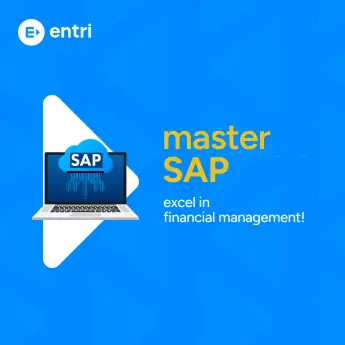Table of Contents
Restarting your career as an MBA graduate after a gap can be a challenging yet rewarding journey, especially when you strategically align your skills with high-demand industry tools like SAP. Combining your MBA’s business knowledge with expertise in SAP modules—especially SAP FICO (Financial Accounting and Controlling), SAP MM (Materials Management), and SAP SD (Sales and Distribution)—can open doors to lucrative roles in finance, supply chain, and sales operations.
Entri’s specialized SAP courses for MBA graduates deliver practical, industry-relevant training and certification that help bridge your career gap with hands-on experience and job-ready skills. Here’s a comprehensive guide to restarting your career with confidence, leveraging your MBA alongside SAP expertise.
Key Takeaways:
-
Leverage your MBA’s business management foundation and pair it with SAP skills to boost employability.
-
Focus on SAP FICO, MM, and SD modules that align with core industry functions like finance, supply chain, and sales.
-
Upskill with Entri’s expert-led SAP courses offering certification, practical exposure, and placement assistance.
-
Gain hands-on experience through internships, freelance projects, or volunteer roles to bridge your gap.
-
Refresh your resume and LinkedIn profile with SAP-relevant keywords such as SAP FICO for MBA, career restart with SAP MM, and SAP SD certification after MBA.
-
Rebuild your professional network through alumni groups, industry forums, and SAP communities.
-
Prepare thoroughly for interviews by combining your MBA knowledge with SAP process understanding and practical application.
Introduction
Taking a career break after earning your MBA is common, but returning to the workforce can feel intimidating given the rapidly evolving business environment. The demand for professionals skilled in enterprise resource planning (ERP) tools, particularly SAP, is rising sharply across industries like manufacturing, retail, finance, and supply chain.
Your MBA degree has prepared you with comprehensive business and management skills—governance, strategy, analytics, and leadership. When complemented with SAP expertise in FICO (finance-focused accounting and controlling), MM (procurement and inventory handling), and SD (sales and distribution logistics), you become a highly competitive candidate for a variety of strategic and operational roles.
Here’s a quick read: SAP Career Path – Everything You Need to Know
This guide provides actionable strategies for MBA graduates to restart their careers through targeted SAP upskilling via Entri’s courses, practical experience building, and networking, enabling you to present a strong, updated profile to recruiters.
Enrol and kickstart your career with SAP FICO certification!
Step-by-Step Guide for Career Restart Strategy
Step 1: Assess Your Skills and Interests
-
Review your MBA learnings in finance, operations, supply chain, marketing, and strategy.
-
Identify which SAP modules fit your interest and career goals:
-
SAP FICO for finance and controlling roles.
-
SAP MM for materials management and procurement.
-
SAP SD for sales operations and distribution management.
-
-
Recognize skill gaps in SAP software and current industry processes.
Step 2: Invest in Relevant Upskilling
-
Enroll in Entri’s SAP FICO, MM, and SD courses, specifically designed for MBA graduates re-entering the workforce.
-
Courses provide:
-
End-to-end process training (e.g., financial accounting, procurement workflows, sales processing).
-
Hands-on practice with SAP software interfaces and tools.
-
Industry-recognized certification that signifies your job readiness.
-
-
Supplement with courses on complementary skills: financial analysis, supply chain analytics, or sales strategy.
Interested in Material Management? Enrol in our course to turn it into a career!
Step 3: Build Practical Experience
-
Apply for internships, trainee roles, or part-time projects with companies leveraging SAP systems.
-
Volunteer to assist small businesses or NGOs in finance, procurement, or sales processes using SAP.
-
Take freelance SAP-related assignments on platforms like Upwork or Fiverr to demonstrate capability.
Read more at How to Be a SAP Certified Professional
Step 4: Refresh Your Resume and LinkedIn Profile
-
Highlight your MBA degree and SAP certifications prominently.
-
Use keywords such as “SAP FICO for MBA,” “career restart with SAP MM,” “SAP SD certification after career gap.”
-
Quantify any freelance or volunteer project impacts: e.g., “Streamlined procurement process leading to 15% cost reduction using SAP MM.”
-
Frame the career gap as a period of upskilling and gaining relevant SAP expertise.
Get more insights at Why Every MBA Graduate Should Add SAP SD to Their Resume
Got a talent for sales and distribution? Turn it into a career here!
Step 5: Rebuild Your Network
-
Reconnect with your MBA alumni, former colleagues, and professors.
-
Join SAP-focused LinkedIn groups — such as SAP Professionals, SAP FICO for MBA, or Supply Chain SAP MM users.
-
Attend SAP webinars, workshops, and industry meets to interact with professionals and recruiters.
Step 6: Prepare for Interviews
-
Refresh knowledge of SAP processes in your chosen module(s) and how they integrate with business functions.
-
Be ready to explain your career gap positively as a time of focused SAP upskilling and practical application.
-
Practice responses combining MBA strategic insights with SAP operational know-how.
Prepare better with Top SAP Interview Questions and Answers
Master SAP with Expert-Led Courses
Unlock your potential with our comprehensive SAP courses! Learn essential modules like SAP MM (Materials Management), SAP SD (Sales and Distribution), and SAP FICO (Financial Accounting and Controlling) from industry experts.
Know MoreHigh-Demand Career Opportunities for MBA Graduates After a Gap
| Job Role | Description | Average Salary (INR/year) |
|---|---|---|
| SAP FICO Consultant | Financial accounting, controlling, and reporting | 6,00,000 – 10,00,000 |
| SAP MM Consultant | Materials management, procurement, and inventory | 5,00,000 – 8,00,000 |
| SAP SD Consultant | Sales order management, distribution logistics | 5,00,000 – 8,00,000 |
| Finance Manager (SAP FICO) | Manage financial operations using SAP Finance tools | 8,00,000 – 15,00,000 |
| Supply Chain Analyst (SAP MM) | Optimize procurement and inventory processes | 6,00,000 – 12,00,000 |
| Sales Operations Manager (SAP SD) | Oversee sales lifecycle, integrating SAP systems | 7,00,000 – 14,00,000 |
(Salaries may vary by company and location. Certification and practical experience strongly impact earning potential.) Read more in detail at SAP Consultant Salary
Pro Tip: Many of these roles value skill proof over past work history, which means a career gap matters far less if you can demonstrate certification, updated knowledge, and practical experience.
Overcoming Common Challenges During Career Restart
Restarting your career as an MBA graduate with a gap, especially focusing on SAP modules like FICO, MM, and SD, is highly achievable but involves navigating a few common challenges. Understanding these hurdles and how to overcome them is key to building confidence and momentum in your comeback journey.
Dealing with Self-Doubt:
Many career restarters experience self-doubt about their relevance and competitiveness compared to active professionals. Your MBA degree has equipped you with strong business acumen, strategic thinking, and leadership skills—foundations that remain valuable regardless of a gap. Coupling that with newly acquired SAP expertise in FICO, MM, or SD boosts your profile significantly.
Celebrate each upskilling milestone, whether completing Entri’s SAP courses, earning certifications, or finishing freelance projects. Joining SAP-focused mentorship and community groups can encourage and affirm the relevance of your skills.
Fear of Rejection:
Initial job applications or interviews may result in rejection, which can dampen motivation. Instead, treat rejection as constructive feedback to improve your resume, interview responses, and networking approach. Reach out for informational interviews with current SAP professionals to understand market demands better. Constantly refine your story about your career gap—framing it as a strategic period of focused SAP upskilling and practical experience. Persistence and continuous learning are crucial to breaking back in.
Feeling Outdated:
The SAP ecosystem and business environments evolve swiftly, making it easy to feel outdated after a break. Keep pace by frequently upgrading your knowledge through Entri’s up-to-date SAP courses covering FICO, MM, and SD, and supplement them with leading platforms like Coursera or Udemy. Follow SAP community blogs, webinars, and forums to stay informed on trends such as SAP S/4HANA, cloud solutions, and analytics. Highlight these ongoing learning efforts on your resume and LinkedIn to reassure recruiters of your readiness.
Explaining the Gap:
Recruiters will notice gaps in your work history—your goal is to control the narrative. Explain your career break as a deliberate period of professional growth, emphasizing SAP certifications, hands-on projects, freelance assignments, or volunteer roles you undertook. Quantify results to demonstrate impact, e.g., “Optimized procurement processes by 15% using SAP MM during my career break.” Being open and confident about the gap repositions it as a strength rather than a weakness.
Balancing Personal Responsibilities:
Returning after family or personal commitments can feel overwhelming. Begin with flexible roles such as part-time SAP consulting, freelance contracts, or internships that align with your available time. Leverage productivity tools and set realistic goals to manage your time effectively. Over time, as you regain confidence, progressively transition into full-time or more demanding SAP roles.
Mentorship and Career Coaching
A strong support system can greatly enhance your MBA career restart journey with SAP. Mentorship and career coaching provide the essential guidance, knowledge, and accountability you need to get back on track quickly.
Benefits of Mentorship:
An experienced SAP professional or MBA-SAP alumni mentor can offer deep insights into current SAP job market demands, recommend which SAP modules (FICO, MM, or SD) to prioritize, and provide valuable networking opportunities. Mentorship not only helps you avoid common career restart mistakes but also accelerates your learning and builds the confidence to apply for high-demand SAP roles.
Finding the Right Mentor:
Seek mentors through MBA alumni networks, LinkedIn’s SAP-focused groups (SAP Professionals India, SAP FICO Community), or via Entri’s learner community, which connects you with industry practitioners. Choose a mentor who understands both business strategy and SAP process integration, and can guide you toward roles like SAP FICO Consultant, SAP MM Specialist, or SAP SD Functional Analyst.
Career Coaching:
For a more structured approach, consider working with a professional career coach experienced in SAP and business management transitions. They can help you define clear career goals, create a targeted SAP career roadmap, optimize your resume and LinkedIn profile with SAP keywords, and prepare you for both technical and HR interview rounds.
Joining Community Groups:
Beyond one-on-one mentorship, join SAP and MBA professional groups where you can gain peer support, share knowledge, and stay current with industry updates. Communities like SAP MM & Logistics Forum, SAP SD Experts Network, and Entri’s alumni groups often post unadvertised SAP job openings, project collaborations, and skill-building events—perfect for career restarters looking to break back in.
Master SAP with Expert-Led Courses
Unlock your potential with our comprehensive SAP courses! Learn essential modules like SAP MM (Materials Management), SAP SD (Sales and Distribution), and SAP FICO (Financial Accounting and Controlling) from industry experts.
Know MoreResources and Tools
Equip yourself with the right resources to accelerate your SAP career restart:
Upskilling Platforms:
Entri’s specialized SAP courses in FICO, MM, and SD focus on practical skills with certification and placement support. Supplement with Coursera and Udemy for broader SAP modules and business analytics.
Job Portals & Freelance Sites:
Use Naukri, LinkedIn Jobs, Upwork, and Fiverr to explore internships, part-time, and freelance SAP projects tailored for career restarters.
Resume & Interview Preparation:
Craft ATS-optimized resumes with tools like Canva and Novoresume. Practice interview skills on platforms like Glassdoor and InterviewBit, focusing on SAP-centric questions combined with MBA insights.
Networking Forums:
Participate in SAP Professionals India, SAP FICO Community, and Entri’s course groups to stay updated and tap into unadvertised roles.
Entri’s community forums for course learners provide peer support and mentoring.
Using these tools in combination will create an ecosystem of learning, exposure, and connection that makes your career restart realistic and achievable.
Conclusion
Restarting your career after an MBA gap is not just about getting back into the workforce—it’s about relaunching yourself stronger, more skilled, and future-ready. Your MBA has already given you the strategic vision and business expertise that companies value. By adding specialized SAP skills in FICO, MM, or SD, you position yourself right at the intersection of business leadership and technology, where the demand for talent is urgent and growing.
But success in this transition isn’t about learning in isolation—it’s about learning from the right mentors, in the right environment, with the right industry connections. That’s exactly what Entri’s SAP courses provide. With hands-on training, real-world scenarios, recognized certifications, and placement support, you’re not just gaining knowledge—you’re building the proof and confidence employers are looking for.
If you’ve been waiting for the “right time” to restart, let this be your sign. Every day you invest in your skills is a day closer to landing that high-paying, impactful SAP role your MBA deserves. Take the step today—enrol with Entri, transform your career gap into a comeback story, and re-enter the market with a competitive edge.
|
Related Articles |
||
Master SAP with Expert-Led Courses
Unlock your potential with our comprehensive SAP courses! Learn essential modules like SAP MM (Materials Management), SAP SD (Sales and Distribution), and SAP FICO (Financial Accounting and Controlling) from industry experts.
Know MoreFrequently Asked Questions
Why should I learn SAP modules after an MBA career gap?
Combining your MBA’s business knowledge with in-demand SAP skills makes you highly employable in finance, supply chain, and sales domains where technical proficiency is critical.
Which SAP module is best suited for MBA graduates restarting careers?
Choose SAP FICO if you are inclined toward finance/controlling, SAP MM for supply chain/procurement, or SAP SD for sales/distribution roles based on your MBA specialization and interests.
How do I explain my gap effectively?
Frame it as a conscious decision to upskill through SAP courses, freelance projects, or volunteering that enhanced your practical knowledge and prepared you for your next professional chapter.
Can freelance SAP projects help bridge my career gap?
Absolutely. Freelance assignments build hands-on experience and demonstrate your capabilities to recruiters.
How do I prepare for interviews blending MBA and SAP skills?
Understand SAP processes deeply in your chosen module, relate them to your MBA strategic knowledge, and practice demonstrating the combined value you bring to potential employers.














